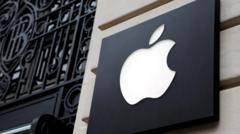A federal judge has referred Apple for a possible criminal contempt investigation after ruling that the tech giant willfully ignored a previous injunction designed to enhance competition in its App Store, initiated by Epic Games. Judge Yvonne Gonzalez Rogers stated that Apple’s actions, including misleading testimony from an executive, warranted the investigation by the US Attorney for Northern California.
Apple Under Criminal Contempt Investigation for Violating Court Ruling

Apple Under Criminal Contempt Investigation for Violating Court Ruling
A US judge claims Apple knowingly breached an injunction aimed at reducing anticompetitive practices within its App Store.
In a recent legal development that has significant implications for the technology sector, a US district judge has flagged Apple for a potential criminal contempt investigation. This decision follows the judge's assertion that Apple "wilfully violated" her injunction, which was originally established to curb Apple’s anticompetitive behavior and allow alternative payment mechanisms for App Store purchases.
Judge Yvonne Gonzalez Rogers addressed the situation following a lawsuit initiated by Epic Games, the developer behind the popular game Fortnite. Epic Games has long argued against Apple’s monopolistic control over app payments, where the company retains up to a 30% commission on transactions. The judge's previous ruling in 2021 had mandated that Apple allow developers to link to their own payment systems, thus challenging its exorbitant fees.
Despite this ruling, Apple allegedly continued to impose its own restrictions and made attempts to dilute the competitive nature of the marketplace, which the judge stated could not be tolerated. According to internal documents reviewed during the contempt proceedings, Apple appeared to know it was flouting the court’s orders while prioritizing its own interests; the judge specifically noted that CEO Tim Cook ignored counsel from senior executives who suggested compliance.
Furthermore, Judge Gonzalez Rogers highlighted that Apple’s vice president of finance had "outright lied under oath" regarding the company’s intentions to respect the injunction, demonstrating a blatant disregard for legal authority. One major point raised was Apple's introduction of a 27% commission rate for off-app purchases, which contrasted with its previous policy of not charging for such transactions.
Epic Games’ CEO, Tim Sweeney, lauded the judge’s ruling and stated that Fortnite would make a return to the iOS App Store in light of these developments. He extended a peace proposal to Apple, suggesting that if the company adopts a worldwide compliance policy to eliminate its "Apple Tax," Epic would cease ongoing legal battles related to the matter.
As this legal saga continues, the implications for other developers and the broader digital marketplace may become clear in the coming weeks, with many closely watching Apple’s next steps in response to the court’s decision.
Judge Yvonne Gonzalez Rogers addressed the situation following a lawsuit initiated by Epic Games, the developer behind the popular game Fortnite. Epic Games has long argued against Apple’s monopolistic control over app payments, where the company retains up to a 30% commission on transactions. The judge's previous ruling in 2021 had mandated that Apple allow developers to link to their own payment systems, thus challenging its exorbitant fees.
Despite this ruling, Apple allegedly continued to impose its own restrictions and made attempts to dilute the competitive nature of the marketplace, which the judge stated could not be tolerated. According to internal documents reviewed during the contempt proceedings, Apple appeared to know it was flouting the court’s orders while prioritizing its own interests; the judge specifically noted that CEO Tim Cook ignored counsel from senior executives who suggested compliance.
Furthermore, Judge Gonzalez Rogers highlighted that Apple’s vice president of finance had "outright lied under oath" regarding the company’s intentions to respect the injunction, demonstrating a blatant disregard for legal authority. One major point raised was Apple's introduction of a 27% commission rate for off-app purchases, which contrasted with its previous policy of not charging for such transactions.
Epic Games’ CEO, Tim Sweeney, lauded the judge’s ruling and stated that Fortnite would make a return to the iOS App Store in light of these developments. He extended a peace proposal to Apple, suggesting that if the company adopts a worldwide compliance policy to eliminate its "Apple Tax," Epic would cease ongoing legal battles related to the matter.
As this legal saga continues, the implications for other developers and the broader digital marketplace may become clear in the coming weeks, with many closely watching Apple’s next steps in response to the court’s decision.




















